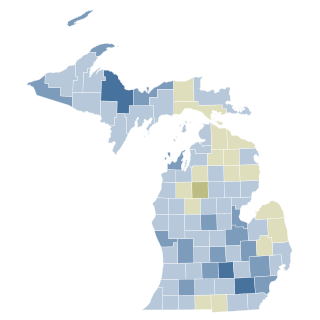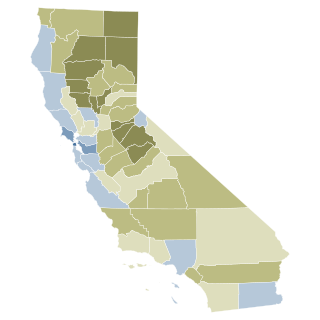
In California, a ballot proposition is a referendum or an initiative measure that is submitted to the electorate for a direct decision or direct vote. If passed, it can alter one or more of the articles of the Constitution of California, one or more of the 29 California Codes, or another law in the California Statutes by clarifying current or adding statute(s) or removing current statute(s).

The Michigan Department of Natural Resources (DNR) is the agency of the state of Michigan charged with maintaining natural resources such as state parks, state forests, and recreation areas. It is governed by a director appointed by the Governor and accepted by the Natural Resources Commission. Currently the Director is Daniel Eichinger. The DNR has about 1,400 permanent employees, and over 1,600 seasonal employees.

Elections in Michigan are held to fill various local, state and federal seats. Special elections may be held to fill vacancies at other points in time.

California Proposition 7, would have required California utilities to procure half of their power from renewable resources by 2025. In order to make that goal, levels of production of solar, wind and other renewable energy resources would more than quadruple from their current output of 10.9%. It would also require California utilities to increase their purchase of electricity generated from renewable resources by 2% annually to meet Renewable Portfolio Standard (RPS) requirements of 40% in 2020 and 50% in 2025. Current law AB32 requires an RPS of 20% by 2010.

Proposition 23 was a California ballot proposition that was on the November 2, 2010 California statewide ballot. It was defeated by California voters during the statewide election by a 23% margin. If passed, it would have suspended AB 32, a law enacted in 2006, legally referred to its long name, the Global Warming Solutions Act of 2006. Sponsors of the initiative referred to their measure as the California Jobs Initiative while opponents called it the Dirty Energy Prop.

The Gallagher Amendment was an amendment to the Colorado Constitution enacted in 1982 and repealed in 2020 concerning property tax. It set forth the guidelines in the Colorado Constitution for determining the actual value of property and the valuation for assessment of such property. The Gallagher Amendment was a legislative referendum drafted by Dennis J. Gallagher, then a state legislator. It was repealed in 2020.

2015 Michigan Proposal 1, also known as the Michigan Sales Tax Increase for Transportation Amendment, was a referendum held on May 5, 2015, concerning a legislatively-referred ballot measure. The measure's approval would have caused one constitutional amendment and 10 statutes to go into effect. It is estimated that Proposal 1 would raise state revenues from sales and use taxes by $1.427 billion, fuel taxes by $463 million, truck registration fees by $50 million, and vehicle registration fees by $10.1 million in the first year. If approved, the proposal was estimated by the Associated Press to result in an average tax increase of $545 per household in 2016.

Washington Initiative 732 (I-732) was a ballot initiative in 2016 to levy a carbon tax in the State of Washington, and simultaneously reduce the state sales tax. It was rejected 59.3% to 40.7%. The measure appeared on the November 2016 ballot. The backers of I-732 submitted roughly 350,000 signatures in December 2015 to certify the initiative.

The Fairness Project is a United States 501(c)(4) charitable organization created in October 2015. They promote general economic and social justice throughout the US by the use of ballot measures to circumvent deadlocks in law changes by the legislative and executive branches of government. They act as a national body by supporting state organizations and campaigns with targeted funding rather than by direct campaigning. They support the gathering of signatures to meet the variable requirements to trigger ballots in states and then aid the campaigns with early financial backing, strategic advice, and various campaign tools.

California Proposition 6 was a measure that was submitted to California voters as part of the November 2018 election. The ballot measure proposed a repeal of the Road Repair and Accountability Act, which is also known as Senate Bill 1. The measure failed with about 57% of the voters against and 43% in favor.

The Washington Carbon Emissions Fee and Revenue Allocation Initiative, also known as Initiative 1631 or the Protect Washington Act was a ballot initiative that appeared on ballots in the State of Washington in the November 2018 election. The initiative proposed to reduce pollution by levying a fee on greenhouse gas emissions generated within the state of Washington, and using that revenue to support air quality and energy projects, as well as water quality and forest health initiatives. The measure failed with 56.3% of voters rejecting it. As of 2018, more had been spent in campaigning for and against the initiative than on any other ballot measure in Washington history.

California Proposition 68 was a legislatively referred constitutional amendment that appeared on ballots in California in the June primary election in 2018. It was a $4.1bn bond measure to fund parks, environmental projects, water infrastructure projects and flood protection measures throughout California.

Michigan Proposal 18-2 was a ballot initiative approved by voters in Michigan as part of the 2018 United States elections. The proposal was created in preparation of the 2020 United States Census, to move control of redistricting from the state legislature to an independent commission. The commission consists of thirteen members selected randomly by the secretary of state: four affiliated with Democrats, four affiliated with Republicans, and five independents. Any Michigan voter can apply to be a commissioner, as long as they have not been, in the last six years, a politician or lobbyist. Proponents argued that Michigan's current districts are gerrymandered, giving an unfair advantage to one political party. Opponents argued that the process would give the secretary of state too much power over redistricting, and that the people on the commission would be unlikely to understand principles of redistricting. The proposal was approved with 61.28% of the vote.

2018 Michigan Proposal 3 was a ballot initiative approved by voters in Michigan as part of the 2018 United States elections. The proposal, funded by the ACLU of Michigan, reformed Michigan elections by protecting the right to a secret ballot, ensuring access to ballots for military and overseas voters, adding straight-ticket voting, automatically registering voters, allowing any citizen to vote at any time, provided they have a proof of residency, allowing access to absentee ballots for any reason, and auditing election results. The proposal was overwhelmingly approved with 66.92% of the vote.

California Proposition 15 was a failed citizen-initiated proposition on the November 3, 2020, ballot. It would have provided $6.5 billion to $11.5 billion in new funding for public schools, community colleges, and local government services by creating a "split roll" system that increased taxes on large commercial properties by assessing them at market value, without changing property taxes for small business owners or residential properties for homeowners or renters. The measure failed by a small margin of about four percentage points.

2020 Florida Amendment 4, commonly known as the Think Twice Initiative was a proposed amendment to the Constitution of Florida that failed by 52.47% to 47.53% in the 2020 election on November 3, 2020. The amendment would have required new constitutional amendments to be approved by voters twice in order to go into effect.

Alaska Measure 2 was a ballot initiative approved by voters in Alaska as part of the 2020 United States elections. The proposal switched Alaska's primary system to a non-partisan blanket primary. The top four candidates progress to the general election, which is conducted with ranked-choice voting. Voting for U.S. president will continue to utilize primaries based on political party, but ranked-choice voting will still be used in the general election. The initiative also requires additional disclosures of campaign financing.

2020 Missouri Amendment 2, also known as the Medicaid Expansion Initiative, was a ballot measure to amend the Constitution of Missouri to expand Medicaid under the Affordable Care Act. The initiative was on the August 4, 2020, primary ballot and passed with 53.27% of the vote. Following similar successful ballot initiatives in other states, Republican lawmakers added work requirements to Medicaid expansions, which supporters aimed to prevent by proposing state constitutional amendments for future Medicaid expansions. Opponents sued to prevent the measure from being voted on, but courts ruled in the measure's favor. The measure was supported most in urban areas and opposed in rural areas. After a delay due to a lack of funding and resulting litigation, the initiative was implemented in October 2021, albeit slowly. Republican lawmakers attempted to roll back the program and add a work requirement through a state constitutional amendment, which failed after the United States Supreme Court did not grant certiorari to similar cases.

Colorado Proposition 114 was a ballot measure that was approved in Colorado in the November 2020 elections. It was a proposal to reintroduce the gray wolf back into the state. The proposition was passed with a narrow margin, making Colorado the first US state to pass legislation to reintroduce wildlife.

2022 Michigan Proposal 2, the Right to Voting Policies Amendment, and also known as Promote the Vote, was a citizen-initiated proposed constitutional amendment in the state of Michigan, which was voted on as part of the 2022 Michigan elections. The amendment changed voting procedures in the state with the goal of making it easier to vote.
















